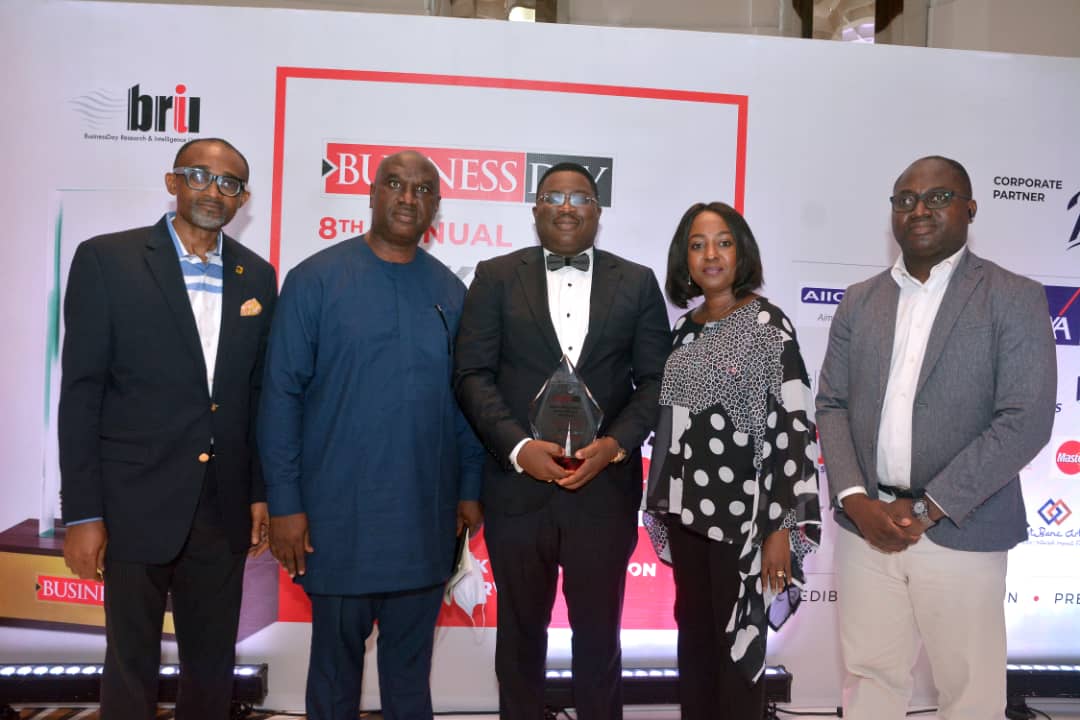...To get all news updates, Join our WhatsApp Group (Click Here)
Also Join our WhatsApp Channel (Click Here)
By Aniekan Ezekiel
From the publisher of BusinessDay, Frank Aigbogun’s welcome address at the recently held BusinessDay’s Banks and other Financial Institutions (BAFI) Awards came the following words: ‘The year 2020 has been a most interesting year. The economy and communities have been managed by disruptions imposed by COVID-19. Yet financial services have shown uncommon responsiveness and compassion towards customers and communities.’Indeed, this has been an unusual year, no thanks to the coronavirus pandemic, but it has been a year defined as much by COVID-19 and its associated disruptions and difficulties as by the unprecedented response in kindness by corporate Nigeria.
BusinessDay’s BAFI Awards recognised achievements in a number of separate categories, each of which was worth its weight in gold. However, it could be argued that in this year of COVID-19, any recognition that took into accountand was informed by the awardee’sCOVID-related activities was probably the most significant of the awards/categories. It is against this backdrop that the recipient of the CSR Bank of the Year award at the BAFI Awards should be celebrated and projected as a model other corporate should emulate.And it came as no surprise that the bank that considers its destiny to be intertwined with Nigeria’s and whose commitment to nation building largely informs its approach to corporate responsibility and sustainability (CR&S),was so crowned as CSR Bank of the Year at the BAFI Awards.
The award was a well-deserved recognition for the exemplary role played by First Bank of Nigeria Ltd, Nigeria’s leading financial services provider, in support of the government and individuals’ as well as its own efforts to deal with the impact of COVID-19. Before the BAFI Awards, and, undoubtedly, proof that the award was not a fluke, CSR Reporters had named FirstBank as the 2020 Philanthropic Financial Institution of the Year in recognition of the bank’s social responsibility in the areas of e-learning and empowerment of SMEs in Nigeria.These CSR awards took cognisance of FirstBank’s unparalleled contributions to CSR, particularly through its e-learning initiative delivered in collaboration with partners from within and outside the continent, such as IBM, UNESCO and Robert & John,and the Lagos State Government.
Whilst different organisations rose to the various challenges resulting from COVID-19 crisis and were supporting in areas such as health and welfare, FirstBank chose and developed the e-learning initiative. FirstBank feltstrongly that the peculiar needs of children and the youth risked being neglected at a time of unprecedented crises – with schools being closed, parents losing jobs, businesses shutting down, government revenues shrinking, health care resources being over-stretched, economic conditions worsening, etc. The banktherefore kicked off an initiative to move one million students to e-learning, alongside its partners,to minimise the disruption to thetheir education resulting from the prolonged closure of schools across Nigeria and ensure that they remain fully engaged during the difficult period, so they can continue to learn and compete favourably with their peers across the world. Over 140,000 students have benefitted from the e-learning initiative.
Focusing on key elements that resonated with its brand, such as dynamism, innovation and nation building,FirstBank’s e-learning initiative is an innovative and dynamic approach to learning which is not only a suitable and resourceful solution at this time, but also one that is intertwined with perhaps the next century’s likely digital approach to learning, especially with the addition of courses such as coding and robotics, which can usher students into the era of the Fourth Industrial Revolution and prepare them for jobs of the future.The e-learning initiative also alignswith the bank’s key focus area in its CSR framework – education. Education remains the single largest beneficiary of FirstBank’s enormous investments in CSR.Currently, 10 universities and three secondary schools enjoy FirstBank’s infrastructure projects; 10 universities are endowed with professorial chairs by the bank; and over 80,000 students in over 80 secondary schools in Nigeria have benefitted from financial literacy, and entrepreneurial and career counselling provided through FirstBank-sponsored programmes. Education consistently attracts the bank’s keenest attention from year to year.This is becauseFirstBank believes that education – quality and relevant education – remains the bedrock of any society and that whenchildren are properly educated, the nation is enabled and global citizens who provide groundbreaking solutions for the continent and the world at large, are produced.
FirstBank’s partnership with IBM on the e-learning initiative, is making available to students the Digital-Nation Africa program, an online youth-focused learning programme that enables innovation and skills development on emerging technologies TheIBM Digital- Nation Africa aims to provide African youth with effective digital literacy. The Platform seeks to enable African citizens, entrepreneurs and communities with the knowledge, tools and skills to innovate, design, develop and launch their own digital skills. It also helps African citizens enhance their digital skills to best meet the needs of the job market.
DNA provides a broad range of courses for various levels of digital literacy, from providing an introduction to the key emerging technologies beneficial for all, through an integrated innovator section to a focused skills enablement section where users can understand the skills and demands of the market and gain proven skills to enhance their job prospects. In addition, it provides free access to practical exercises and to allow for new ideas to be brought to life through focus areas such as Artificial Intelligence, Coding, Cloud, Internet of Things, Blockchain, Data Science and Analytics, and Cyber Security. There are currently nearly 14,000 registrants on the program, which is promoting opportunities to learn skills of the future.
The partnership with Curious Learning is designed to reach smartphone users using available curated and tested literacy and numeracy apps – with free access provided to these apps. Curious learning is delivering academic-based content for students aged three to eight througha number of mobile applications designed to empower these young children in a fun, self-guided learning process through exploration and curiosity to help them with their cognitive skills at a fundamental level. Examples of these apps are Feed the Monster and Read with Akili.Efforts are in place through Curious Learning to ensure the e-learning initiative swiftly moves across the country to school children and individuals with the need to promote the pursuit of knowledge, irrespective of age. This is critical in identifying with the roles of children at securing the future of any country.
Another partnership in FirstBank’s e-learning initiative is the one with Lagos State Government and Robert & John,an Edu-tech company that owns Roducate. The Roducate e-learning platform, structured in line with the government’s accredited curriculum for primary, secondary and tertiary schools across various fields of academic endeavours, such as science, commercial and arts, includes tutorial videos to reinforce the learning engagement, as well as assignments and mock exams to test students’ knowledge and progress in the course of studying. Learning on the platform also enables note taking for quick reference, and to foster extra-curricular activities, provides exciting features to make learning exciting and fun, such as podcasts and various games like brain pulse, monster munch etc. which allows students to play with one another online, thereby building relationships and promoting interactive learning.
So far FirstBank has provided20,000 low-end devices preloaded with Roducate offline (presented to Lagos State Government for distribution to students) and enabled over 120,000 free sign-ups,on the Roducate e-learning platform, with the ultimate goalbeing to empower at least one million students. ‘This [e-learning] solution,’ according to Dr Adesola Adeduntan, Chief Executive Officer of FirstBank, ‘will see Lagos State offer children in the lower bracket, who may not have access to devices or data from home, affordable smart phones preloaded with the curriculum. The phones have SIMs and limited data tied, only, to the Roducate learning product, which means the recipients cannot browse, encouraging safe learning, but they can still submit tests, mock exams, etc.’ Dr Adeduntan, who encouraged parents and guardians to have their children and wards registered so their educational development is not held back, noted that the initiative is ‘in keeping with who we are at FirstBank, [where] our commitment to self-development and continuous improvement is never far from our thinking.’ In addition, FirstBank is a member of the Global Education Coalition led by UNESCO which is a platform for collaboration and exchange to protect the right of education during this unprecedented disruption and beyond.
Furthermore, in a bid to support SMEs operating in the education sector, FirstBank created a matching fund scheme of ₦5 billion LSETF-FirstEdu Loan, in partnership with the Lagos State Employment Trust Fund (LSETF). The scheme is designed to cushion the impact of Covid-19 pandemic on low-cost private schools by providing loansto them at an attractive interest rate. At the launch of the scheme, the Managing Director/CEO of FirstBank, Dr Adesola Adeduntan said: ‘At FirstBank we recognise the indelible role played by the education sector in the growth of any economy and this underscores our partnership with Lagos State Government for continuous development of the education services in Lagos State and the nation as a whole. The commitment by the Lagos State Government – including this partnership – to enable schools is quite commendable as this will mitigate the challenges caused by the lockdown on the education sector following the COVID-19 pandemic.’
Woven into the fabric of society for over 126 years, overcoming challenges and remaining a dominant player in Nigeria’s financial services landscape, FirstBank has been partnering and supporting various sustainable activities towards the continued growth of its host communities and the nation at large. As a responsible corporate organisation committed to supporting all its stakeholders in the most sustainable manner possible,the bankhas partnered various state governments through the private sector-led Coalition Against COVID-19 (CACOVID) intervention with a view to promoting the readiness and efficiency of health care professionals and other compatriots at the forefront of fighting the pandemic. Beyond Nigeria, FirstBank’s sub-Saharan African subsidiaries have also been involved. So farthey have made donations amounting toUS$173,000 in cash and kind towards alleviating the impact of COVID-19 on the continent.
According to BusinessDay, the BAFI Awards,convened annually to recognise and celebrate organisations that have achieved excellence in the delivery of their financial services across the entire client and customer spectrum, is adjudged the most rigorous, prestigious and transparent awards programme in the industry. Since its inception in 2014, when the first edition held, its organisers, BusinessDay has implemented an audit-based approach in the evaluation process, meticulously reviewing each shortlisted company’s financial reports, commissioned customer perception surveys and analyst opinion, then comparing these with its competition in a longitudinal study. The BAFI Awards have become established as the benchmark of distinction for institutions in the financial services sector. Its rising popularity among leaders in the banking, investing, insurance, and asset management subsectors have earned the BAFI Awards a reputation as ‘the only recognition you deserve’.
The BAFI Awards is backed by the BusinessDay Research and Intelligence Unit (BRIU).Nominations for the BAFI Awards are the culmination of a rigorous review process. The BRIU and an independent panel of judges evaluate more than two hundred and fifty institutions and benchmark them against their global peers using several indices in a thorough evaluation process. Nominees are assessed for their vision, execution and market leading propositions. The BAFI award categories cut across banking, insurance, capital markets, investment, pension funds, trustees, registrars, stockbroking and private equity. This year’s event where FirstBank won Best CSR Bank of the Year (and a second award – Best Mobile Banking App), was themed: Interpreting an Irrational Year: Coping, Adjusting and Thriving in a Wicked Learning Environment.
You can get every of our news as soon as they drop on WhatsApp ...To get all news updates, Join our WhatsApp Group (Click Here)
Also Join our WhatsApp Channel (Click Here)

















